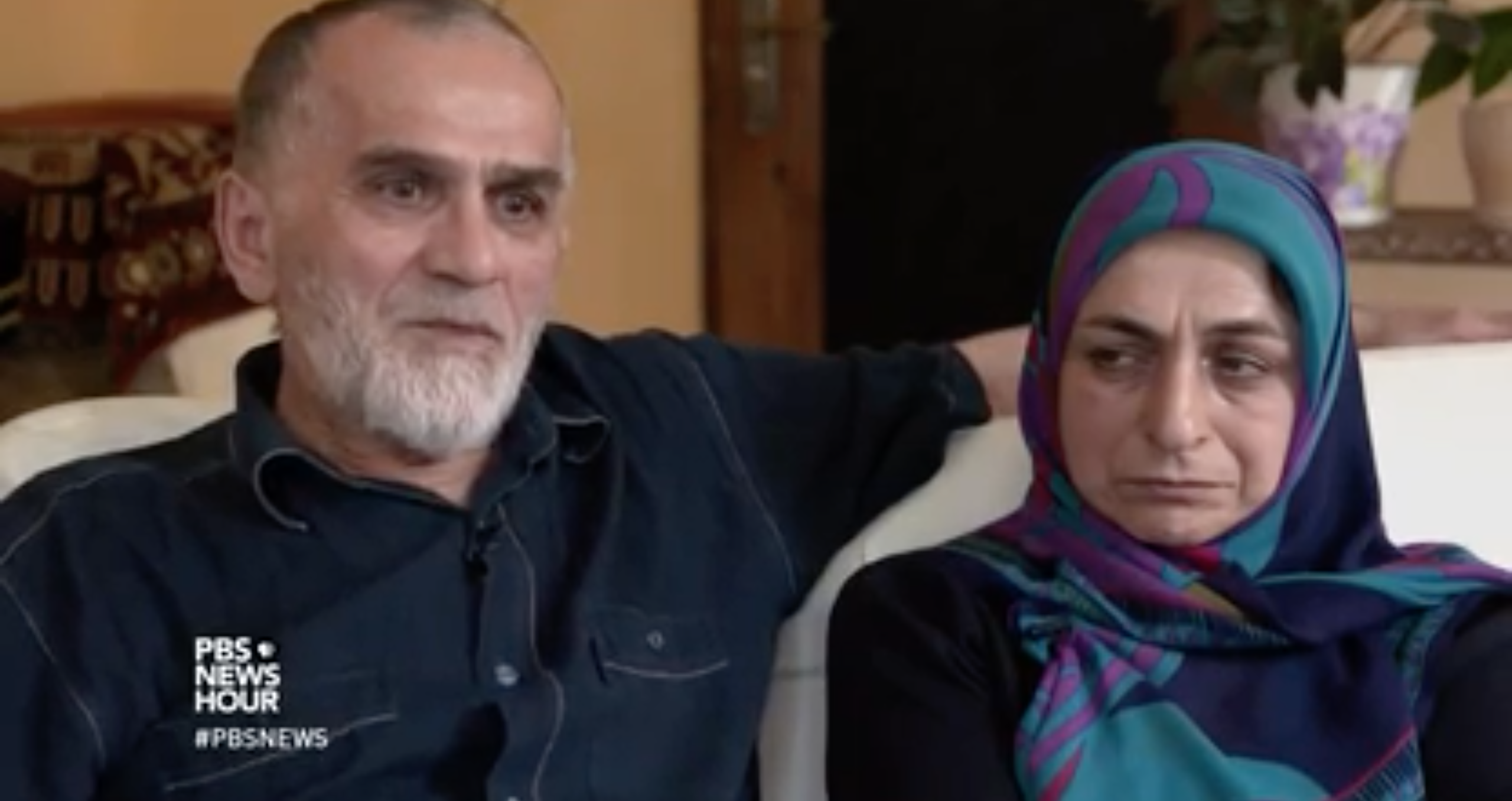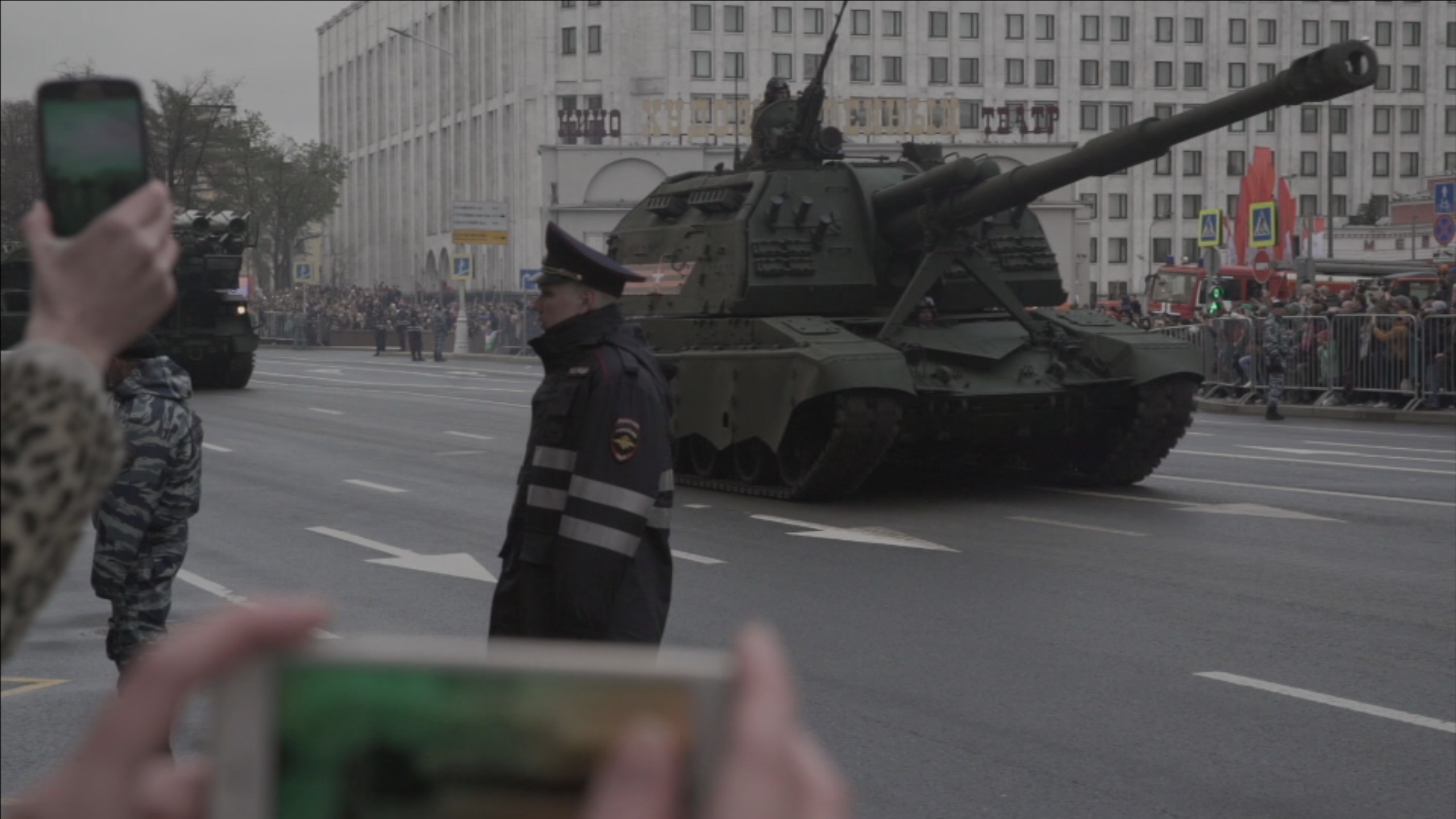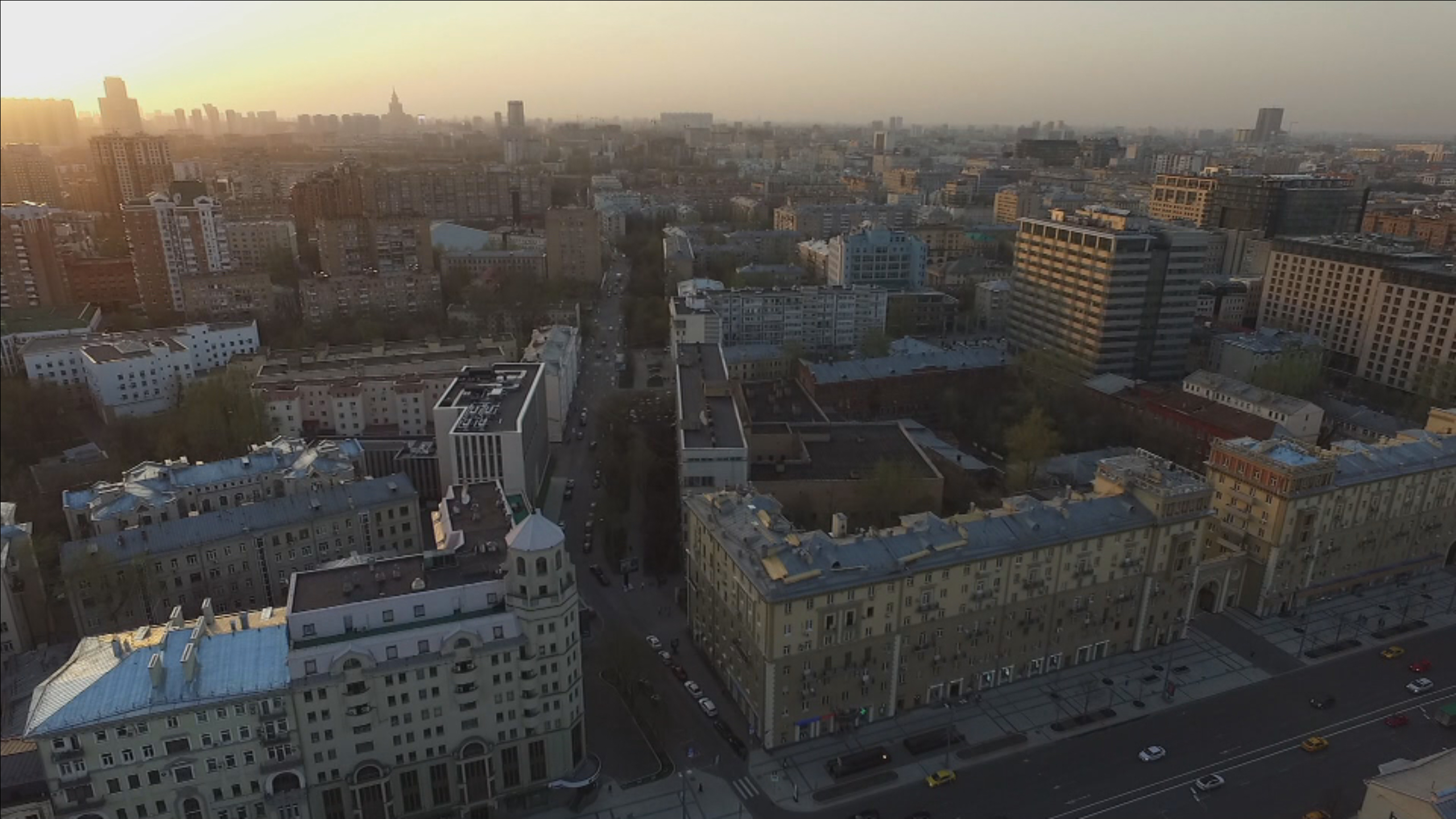
JUDY WOODRUFF: Now we continue our series Inside Putin's Russia, and travel to the country's southernmost border.
The Republic of Dagestan is in the North Caucasus, near the Caspian Sea. Over the past two decades, a brutal separatist insurgency has fought the Russian state, and violence has spilled over from neighboring Chechnya, where Russia fought two wars.
Many Americans may recall Dagestan as the original home of the Boston Marathon bombers, but now a new problem. By one estimate, as many as 5,000 Dagestanis are fighting for ISIS.
Again, in partnership with the Pulitzer Center on Crisis Reporting, special correspondent Nick Schifrin and producer Zach Fannin examine why.
KAZIM NURMAGOMETOV, Father of ISIS Fighter: It is no accident that the youth are tempted to go to Syria, because, today, there is a revival of Islam.
NICK SCHIFRIN: Kazim Nurmagometov is 62 years old, and his son fought for ISIS. He was never tempted to go to Syria, but he and his wife, Rashida, understand why their son, Marat, was.
KAZIM NURMAGOMETOV (through interpreter): The Islamic call I was talking about, the one in every Muslim's soul, is hidden deep down. It's like a light in someone's heart.
NICK SCHIFRIN: Nurmagometov lives deep in the Caucasus Mountains, where nearly dried-up rivers meander through 1,000-foot-high cliffs, and beyond ancient rock formations, isolated dirt roads connect secluded villages.
One of those villages is Karata. Official population is 4,000, but residents say it's half that size. This area is nearly 100 percent Muslim. Before Friday prayers, men greet each other in the small town center. There are few young people, in part because this small village sent as many as two dozen to ISIS, al-Qaida, and the wars in Syria and Iraq.
That's her? That's your daughter.
AMINA KONDAKOVA, Mother of ISIS Fighter (through interpreter): Yes.
NICK SCHIFRIN: Amina Kondakova is a Muslim convert. She shows me photos from a happier time.
That's very cute.
She says they grew up traditional and comfortable. And then, two years ago, her daughter Miryam and her son Ali Askhat told her they were going on vacation. Instead, they traveled with Miriam's husband to Mosul, Iraq, to join ISIS.
AMINA KONDAKOVA (through interpreter): They lied to me about going there. I was so disappointed. And then I became afraid about what could happen to them.
NICK SCHIFRIN: She says this town is pious, but wasn't religious enough for her daughter.
Did she feel judged by people in this society?
AMINA KONDAKOVA (through interpreter): Yes, they gave her looks. They didn't like how she was dressing. They wanted her to dress like everyone else. She wanted to dress to way it's written for a Muslim woman to dress.
NICK SCHIFRIN: Kondakova believes that judgment drove her daughter away. She reluctantly admits that, in Mosul, her daughter is happy raising her first grandson.
AMINA KONDAKOVA (through interpreter): "Mom, I feel like I was reborn here. I regret all those years I spent in Dagestan. Don't you want to come here too? I want to live with you, want you to see my boy growing up."
NICK SCHIFRIN: Nurmagometov gets to see his grandson. When his son Marat left for Syria, he abandoned a pregnant wife. Alexey is now 3 years old. They look at photos of Marat as a boy, and a young Marat clowning around with his older brother, Shamil.
When you look at these, does it make you wish that your sons could all be here with you together?
KAZIM NURMAGOMETOV (through interpreter): I am a realist. I know there's no return. Life isn't a book where you can tear out the pages if you didn't like what you wrote, and write new ones.
NICK SCHIFRIN: The Dagestanis who fought for ISIS continue a decades-old legacy here of radicalism and militancy.
There's been a local insurgency here in the capital of Dagestan, Makhachkala, for years, targeting both local authorities and symbols of the national government. Their most prominent attacks targeted civilians in larger cities.
In Moscow in 2010, militants allied with al-Qaida blew up the subway. In 2013 in Volgograd, they blew up a bus station, and then a commuter bus, as seen on Russian media.
HABIB MAGOMEDOV, Former Anti-terror Official (through interpreter): There was no social or physical protection. Every day, there were bombings, terror attacks that cost people's lives.
NICK SCHIFRIN: Habib Magomedov is a former police lieutenant colonel and member of Dagestan's anti-terrorism committee. He says conservative Islam, combined with high rates of unemployment and poverty, to radicalize.
HABIB MAGOMEDOV (through interpreter): It's the living conditions, absence of possibilities, absence of social mobility, which creates waves of anger and distress. There has to be some sort of history that sets the person on a certain track, where you only need to light a match for the fire to start.
NICK SCHIFRIN: That match is often a brutal security crackdown. In January 2013, Russian special forces flooded into Dagestani villages. Locals say security services have practiced collective punishment against entire families, torture, even extrajudicial executions.
Magomedov admits they went too far, but he tries to explain their motivation.
HABIB MAGOMEDOV (through interpreter): If keeping people safe requires limiting rights and freedoms of certain individuals, it's probably worth it. My brother died in 1998 when someone threw a grenade in his house. You know, the freedom of one man ends where the freedom of another starts.
NICK SCHIFRIN: Today, the violence has diminished. But it's still religious Muslims whose freedoms are most often restricted.
This mosque practices an austere and aggressive form of Islam. It also rails against government policy, and that makes it a police target. After prayers, police set up a checkpoint. Officers must meet a monthly quota of arrests, leading to what many call indiscriminate detentions, including of journalists trying to tell the mosque's story.
We were filming that scene from across the street, just standing on the sidewalk for only about 90 seconds, when police came up and arrested us. They threw us into their car. They drove us to the precinct. They refused to tell us why they were arresting us.
Why is he being arrested?
And when we were in the station, we saw dozens of men who had been in that mosque before also arrested. That is simply how people here act.
Thirty-three-year-old Mogamet Mogametov is the mosque's spokesman.
MOGAMET MOGAMETOV, Mosque Spokesman (through interpreter): As you saw yourself, they arrest people not because they're suspicious, but only because they came to a mosque.
NICK SCHIFRIN: Do you think that the tactics that the police use can help to radicalize young people here?
MOGAMET MOGAMETOV (through interpreter): Of course. This is the thing that provokes people. Since literally everyone can be arrested, not on the basis of actual cause, but something totally subjective, then of course that irritates.
NICK SCHIFRIN: And that helped lead so many to ISIS. The group exploits the abuse. Russian language propaganda says Russia oppresses Muslims, and presents Syria and Iraq as a pious paradise fit for families.
And as ISIS recruited Dagestanis, Russian security services showed some the door, exporting extremism by facilitating their travel to Syria.
HABIB MAGOMEDOV (through interpreter): It was the right thing to do. Since the moment these people left Dagestan for Syria, local terrorism dropped dramatically. If they had stayed, there would have been terror attacks. There would have been human casualties.
NICK SCHIFRIN: Who helped you leave? Who facilitated your departure?
One of those who was pushed is this 27-year-old Dagestani who now lives in Turkey. We agreed to hide his face and alter his voice.
MAN (through translator): People who were on the federal wanted list could somehow get a passport and leave the country. Some security officers said to them, we will either kill you or you can leave the country.
The way I was helped was that every time I went to my local government office, I was taken by the police and interrogated. But when I went to get a passport, nobody stopped me.
NICK SCHIFRIN: And after the Dagestanis left, Russia made sure they never came back.
MAN (through interpreter): They simply said that, if I come back, they will do bad things to me. So I won't ever go back.
NICK SCHIFRIN: Many Dagestanis who fought for ISIS have died in Syria, and they're celebrated by ISIS propaganda. But some managed to escape, often to the port city of Odessa, Ukraine.
Former ISIS fighter Marat agreed to talk to us if we didn't show his face.
MARAT, Former ISIS Fighter (through interpreter): The majority went to Syria with the notion of jihad, that Assad was repressing Muslims and we needed to help them.
NICK SCHIFRIN: We have actually already met Marat. He's the son of Kazim Nurmagometov. Kazim is often in Odessa to visit.
KAZIM NURMAGOMETOV (through interpreter): We consider our family lucky. He is back, alive and healthy, and realized that where he ended up wasn't what he thought it was.
NICK SCHIFRIN: When his son left for Syria, Kazim didn't sit back and let him die. He traveled to the outskirts of Aleppo and saw the destruction. He helped convince Marat he made a mistake. Marat finally left when he thought about his own son.
MARAT (through interpreter): I was thinking about him constantly, hoping that I could leave and see my child. I was always thinking about what a big mistake I made. Thank God I was able to leave there alive, because practically everyone I knew there, no one is left alive. They all died there.
NICK SCHIFRIN: Marat will never return here, to Dagestan. And that's what has inspired Kazim to speak on camera for the first time.
KAZIM NURMAGOMETOV (through interpreter): There are thousands of ISIS fighters in Syria who want to leave. I feel it. Maybe my story will be a lesson, how to do it, what obstacles to expect. I feel some sort of responsibility to use my experience to help get others out.
NICK SCHIFRIN: People like Kazim's neighbor, Amina. She fears her daughter is dead. She hasn't heard from her in four months.
What would you say to that mother in America who's listening to your story?
AMINA KONDAKOVA (through interpreter): Don't let your children go anywhere. Look after them. Look after their every step, but don't let them leave you, ever.
NICK SCHIFRIN: But their children have left this place. And most will never return.
For the PBS NewsHour, I'm Nick Schifrin in Karata, Dagestan.
JUDY WOODRUFF: Our week-long series Inside Putin's Russia continues tomorrow with a look at what happens to those who dare to stand up to the Kremlin.

Education Resource
Meet the Journalists: Nick Schifrin and Zach Fannin
Pulitzer grantees Nick Schifrin and Zach Fannon spent eight weeks in Russia exploring what the...






